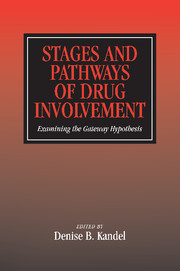Book contents
- Frontmatter
- Contents
- List of Contributors
- Foreword
- Preface
- Part I Overview
- Part II Recent Substantive Findings: What Do We Know About Stages of Drug Use, Risks, and Protective Factors?
- Part III Impact of Prevention Interventions: A Test of the Progression Hypothesis
- Part IV Methodological Issues and Approaches: Advantages and Limitations of Alternate Methods
- Part V Animal Models and Biological Processes: Implications for Drug Progression
- Part VI Conclusion
- 16 The Gateway Hypothesis Revisited
- Index
16 - The Gateway Hypothesis Revisited
Published online by Cambridge University Press: 25 July 2009
- Frontmatter
- Contents
- List of Contributors
- Foreword
- Preface
- Part I Overview
- Part II Recent Substantive Findings: What Do We Know About Stages of Drug Use, Risks, and Protective Factors?
- Part III Impact of Prevention Interventions: A Test of the Progression Hypothesis
- Part IV Methodological Issues and Approaches: Advantages and Limitations of Alternate Methods
- Part V Animal Models and Biological Processes: Implications for Drug Progression
- Part VI Conclusion
- 16 The Gateway Hypothesis Revisited
- Index
Summary
The chapters in this volume present what is currently known about the Gateway Hypothesis. Their authors have explored the hypothesis from various perspectives ranging from developmental social psychology to prevention and intervention science, and from animal models and neurobiology to analytical methodology. The presentations have elaborated the nature and extent of the empirical support for the Gateway Hypothesis at this point in time. They have also revealed the complexities embedded in the formulation of the Gateway Hypothesis. In this brief Afterword, we revisit the hypothesis in light of what our colleagues have reported, and we discuss several conclusions that derive from their presentations.
Parsing the Gateway Hypothesis
Advancing understanding of the Gateway Hypothesis requires that it be parsed into three interrelated, component propositions. All three have emerged from the research and the reviews reported in the preceding chapters.
The first proposition embedded in the Gateway Hypothesis is that among adolescents there is a developmental sequence of involvement with different classes or categories of drugs, such that initiation into drug use begins with the drugs earlier in the sequence, namely, the legal drugs, alcohol and tobacco. Involvement with illicit drugs occurs later in the developmental sequence; and marijuana is the bridge in the sequence between the licit and the other illicit drugs.
- Type
- Chapter
- Information
- Stages and Pathways of Drug InvolvementExamining the Gateway Hypothesis, pp. 365 - 372Publisher: Cambridge University PressPrint publication year: 2002
- 27
- Cited by



